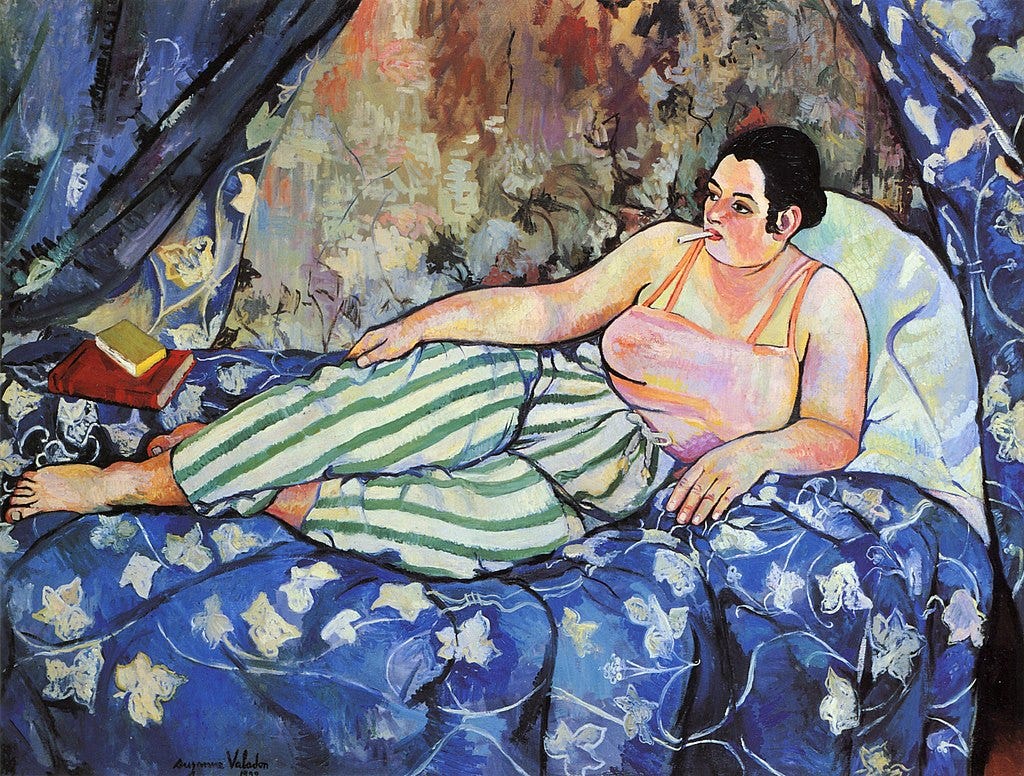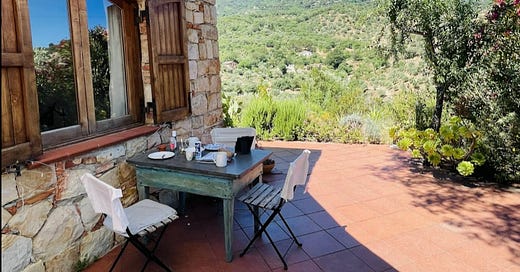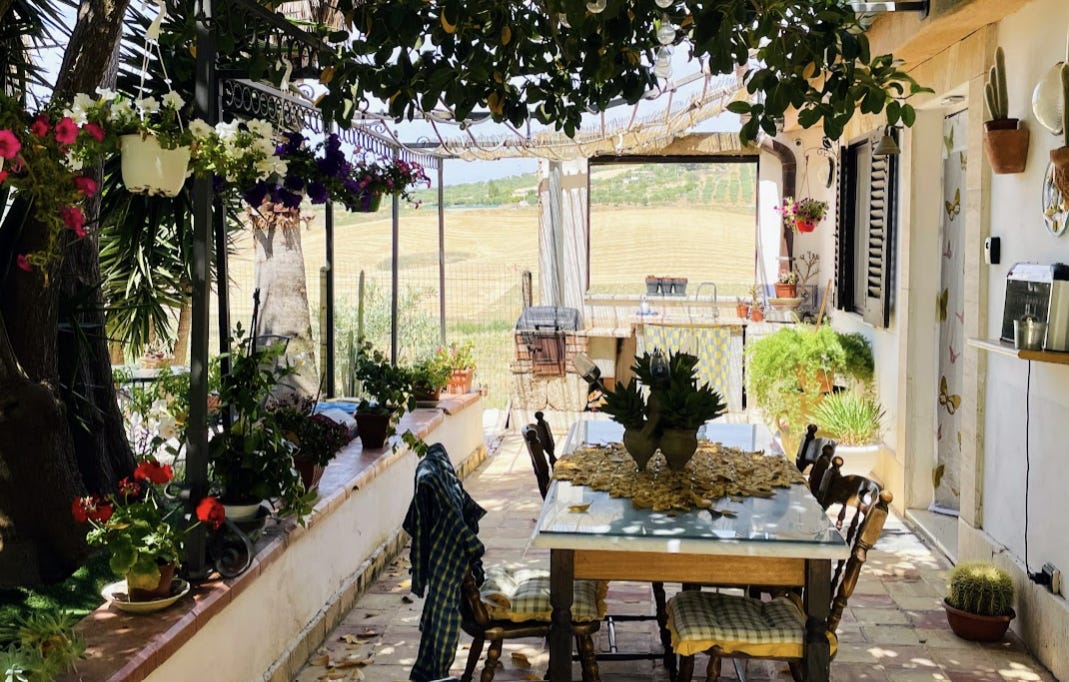Hello! It’s been an amazing two weeks since I published my last post, “Two Years Ago I Quit My Life.” I’ve watched in amazement as the number of likes and comments increased almost exponentially. The likes are over 1,100 now and the comments 380! Crazy, huh? More importantly, this post has brought over 700 new subscribers. Welcome to our little corner of Substack! I’m so glad you are here!
This brings the number of free subscribers over 2000, which was my goal for the year. You’ve helped me shatter it! All of my content has been free for a while, with the idea that I would add on features if/when the number of subscribers increased, including paid subscribers. If you’d like to be more involved in our community and learn more about my journey, consider upgrading.
Some of the things I’ve been thinking about trying out for paid subscribers:
Group reads. I know many of us have read Elizabeth Gilbert’s Big Magic, but I’ve been wanting to read it again and would love to read it with you! Interested? (I have lots of other books in mind as well.)
Sharing resources that have helped me think my way through my transition.
Interviewing some of the people who have inspired me and helped me along the way.
A dedicated group chat for paid subscribers that would allow people to reach out to the community with their own questions and experiences they’d like to share.
If this appeals, then you can upgrade to paid ($45/yr. or $5/mo.) to be a part of it. Once I get enough to begin taking time away from other actvities, I’ll begin.
I will also continue to share, free for all, stories of inspiring women artists and writers as well as occasional essays about the writing life and discussion threads.
To say that I was surprised my last post went viral is a huge understatement. It was a rather personal piece, simply updating my readers about where I’m at now. But I think what resonated most with people is the basic idea that you CAN change your life. So many of us feel stuck and unsure of what our options are.
I’ve been amazed by the many comments from readers considering big changes in their lives, embarking on new adventures, or struggling to adapt to new circumstances thrust upon them. It was hard to keep up with the comments, and clicking on notifications doesn’t always bring me to the precise comments, so I’m afraid some fell through the cracks. But I’ve tried to read and respond in some way to everyone. It’s also been wonderful to see so many responding to others—cheering, comforting and encouraging each other. You all are the best!
There are many themes running through the comments that stand out to me, but I’d like to address one in particular that came up here and in another Substack’s comments recently. That is the question of age.
How old is too old to change your life?
Many of the comments are from people in their 40s, 50s, and older who are shifting gears or embracing the life they always wanted to live. There is so much inspiration and courage in the comments! If you need some, spend a little time reading through them. But I also saw some questioning whether they were too old to embark on a new adventure.
I was 52 when I quit my life and set out to start over. Older friends told me, “You are smart to do it now, while you still can.” Now I’m 54, and I have discovered that I can’t travel like I used to when I was younger. I’ve always preferred to travel at a leisurely pace, but co-leading a recent group trip around Italy reminded me that I can no longer do intense trips, moving cities every few nights. We were walking 5-7 miles a day, interacting with each other nonstop (I’m a people-loving introvert, so people sap my energy), and I was not getting enough sleep at night. I was exhausted! My autoimmune symptoms began to reappear, and then I got the bug going around our group. So I ended up spending a lot of the last five days in bed. :(
But fitness for travel is not really the real issue. You can always adapt, as I’ve done. I have mostly tried to stay in one place for a month or so and explore it gradually, which has always been my preferred mode of travel.
The bigger question is, can we reinvent ourselves, become someone different, after we’ve spent so many years pursuing one path? Money will always be an issue, which I’d like to talk about in a future post. But another fundamental issue is how we see ourselves and the stories we tell ourselves about what is possible.
As we get older, it seems as if our horizons get smaller. My world before I began to travel felt so small. I was so busy that I spent my life in my car, in my house, and in my office. Getting out to see new things—let alone to look at the sky—was a rare occurrence. My trips to Europe over the three summers that I taught study abroad—in Ireland, Austria, and France—opened up the world to me again. And at the end of those summers, it was so hard to go back home. But I did, and life slid right back into overdrive.
As we get older, it also seems that we start to feel less and less like the world is there for us to explore. We worry about moving, traveling, or simply giving up what is familiar.
Before it’s too late . . . the voice in my head told me every moment that I was still enough to listen.
After my brother died of brain cancer in 2021, I knew that I had to make a change now, before my time ran out. He was almost ten years younger than I, and he didn’t get to live his dream of leaving the Midwest and traveling the world. My sister and I were with him as he took his last breath. That moment forever changed both of us.
I can do this . . . was the mantra I had to learn to chant in my head.
The first step in any journey is the believing in yourself. You have to be able to tell yourself, Yes, this crazy, outlandish, audacious thing I’ve fantasized about is actually possible! Because, unfortunately, there will likely be some people in your life who will either directly disapprove or more indirectly question what you are doing. It’s not your job to convince them. What’s important is that you are convinced! Doubts will naturally crop up, but deep down you must have faith in yourself.
It doesn’t happen overnight. It took me a few years of fantasizing and doing research about the possibilities for supporting myself and where I might live to feel comfortable that I could leave my job. (But as I explained in my previous post, I didn’t have a concrete plan and chose to take time to travel instead.) But I wondered, was I capable of leaving my marriage, too, and breaking up my home, and living out of my suitcase?
Even more, could I fundamentally re-envision my life? Not right away. I took time to figure that out. So I set out in search of answers. But before I left, at a certain point I just knew that whatever I found would be my choice—and I would be better off. I had to believe that in order to make the leap.
It’s not too late
There are so many wonderful examples of women changing their lives. Two of the women artists I’ve written about reinvented themselves later in life:
Julia Margaret Cameron became a pioneering art photographer after receiving her first camera when she was 48 years old. That was in the 1860s! From the beginning she copyrighted her work and began exhibiting it.

Suzanne Valadon gave up art to get married and raise her son. Then at 45 she left her husband, took a younger lover, moved back to Paris, and became a serious artist—in the 1920s.

And there are many more. George Eliot published her first novel at 40, as did Edith Wharton and Toni Morrison. Penelope Fitzgerald was 60. Each of these women reinvented themselves as authors in so-called middle age.
There are lots of notes, tweets, and listicles online with many more examples of writers who began to publish or who became famous later in life. These invariably receive a ton of comments to the effect of—There’s still time for me!
Yes, there is still time. And it seems Gen X women—born after 1965 and hitting menopause—are insisting upon it!
Watts nailed it in her newsletter recently:Unlike any generation before us—Gen X women have the opportunity and ability to live two lives. During the first half of our lives, we were so focused on building the scaffolding we were told we needed to have the careers, partnerships, and children (that we were also told we needed). We agreed to all of the obligations and became beholden to expectations. But now, at the beginning of the second half of our lives, we are realizing we have another half of a lifetime to burn all that scaffolding down and create new lives based on our own wants and needs.
And, she says, we are living longer and healthier, so we have the time. The cliff of menopause doesn’t have to be an ending. That is the old script. This time of life can also be a new beginning!
After living the “default life”—marrying, raising kids, working too hard, and accumulating too much stuff—we wonder, Is this it? Is there something more? Now is precisely the time that we can put ourselves at the center of our lives and ask, What do I want?
After twenty years of mostly taking care of my daughter’s and husband’s needs first, I had no idea what I wanted. If you put yourself last, you can’t even see yourself anymore! So I took my time, getting to know myself again, trying things out, and asking myself, do I like this? Do I want more of this? Or less?
What do YOU want?
I wrote about desire and figuring out what we want—and how hard that is for women—a couple of months ago. Since we have so many new folks here, I’ll share an excerpt from it.
So much of our training as women tells us that we are objects of desire rather than desiring subjects. We know this. . . . As girls we were often expected to please others, and as women we fear being called selfish. We put others’ needs first, we stifle our own desires, or, worse, we forget we even have them. I’m talking here about sexual desires, sure, but also other things we want in our lives. It’s not just that we fear wanting certain things. It’s the desiring in the first place that can feel so wrong.
desire (v.): wish, want, crave, to yearn for, to have a longing for.
I thought a lot about desire as I left my old life and started a new one. Then last week I came across a response to an old post of mine. And it all came rushing back to me. The respondent had recently discovered why she was unhappy in her life: “because I’m still catering to the needs of others,” she said, “and not truly putting MY needs first because it feels selfish! Yet I crave solitude to write, to really create a life for myself on my own terms.” It broke my heart to read this, because I knew the feeling well.
This is exactly where I was when I hit rock-bottom a few years ago. And it’s a place so many of us have been. It is the age-old problem for women who desire to write, who crave the freedom of mind to imagine new lives for themselves. We stifle our own needs for solitude and subjectivity because we fear being selfish. And then one day we realize we don’t know what we want anymore.
In her book Women and Desire: Beyond Wanting to be Wanted (1999), Polly Young-Eisendrath writes in the very first sentence,
In twenty years of practicing psychoanalysis and psychotherapy, I have found that the question What do you want? produces bewilderment in most women. We often do not know or we cannot say what we desire. [Read more . . .]
I’d love to hear your thoughts . . . What has resonated with you here? Do you feel that we can reinvent ourselves at any age? Have you (re)connected with your desires lately? How can we put ourselves at the center of our lives? I look forward to hearing what you have to say.
See you in the comments!
—Anne
P.S. If you enjoyed this post, please click on the heart at the bottom or the top of this email. It helps others discover Audacious Women, Creative Lives. And makes me super happy!







Your reflections speak to many of us because they cause us to consider our own lives. In your previous post where you asked us to share what we wanted to quit, I couldn't respond to the question directly because it is impossible (for me) to quit what I'd most like to quit (the reasons are many). This bothered me, and I thought deeply about it. Was I lacking courage? Was I giving up? Settling? The truth is, when I quit things in the past, many of the challenges I was trying to escape stayed with me. Life is life. In this post, however, I like better the question of whether we can reinvent ourselves. Yes, we can. I can. Even within the confines of the things I'd like to quit, I can reinvent myself and am doing so by becoming a fiction author at age 65. It reminds me of the saying, grow where you are planted. Reinventing oneself at any age requires curiosity, perseverance, and commitment. And it is scary! But it is lifegiving. That is the real challenge, to constantly become.
Thank you, Anne, for such an inspiring newsletter. As always. I found myself casting back in memory to see how your comments fit my life.
I’ve been married three times. Crazy, huh? Clearly there was something about the comfort and expectations of marriage that I craved. But it never quite fit. It was always in conflict with my writing, which was and is at the center of my life and has been for fifty-four years. Finally, in the last years of my last marriage, a kernel of truth became evident: I desired solitude. I didn’t need a witness to my life anymore and I didn’t want to be witness to my husband’s life anymore. In 2009 I began living alone in earnest and I have been amazingly happy and comfortable. Not having to privilege anyone else’s needs, writing what I want without censoring myself, not having to negotiate every little thing — these are the bedrock conditions I love.
I’ve written a manuscript of micro-memoirs about this metamorphosis. It’s titled OLD FIDDLE. The title is taken from Emerson: “Old fiddles make the sweetest music.” I hope to find a publisher soon. I write what I want. No one else’s needs get in my way.